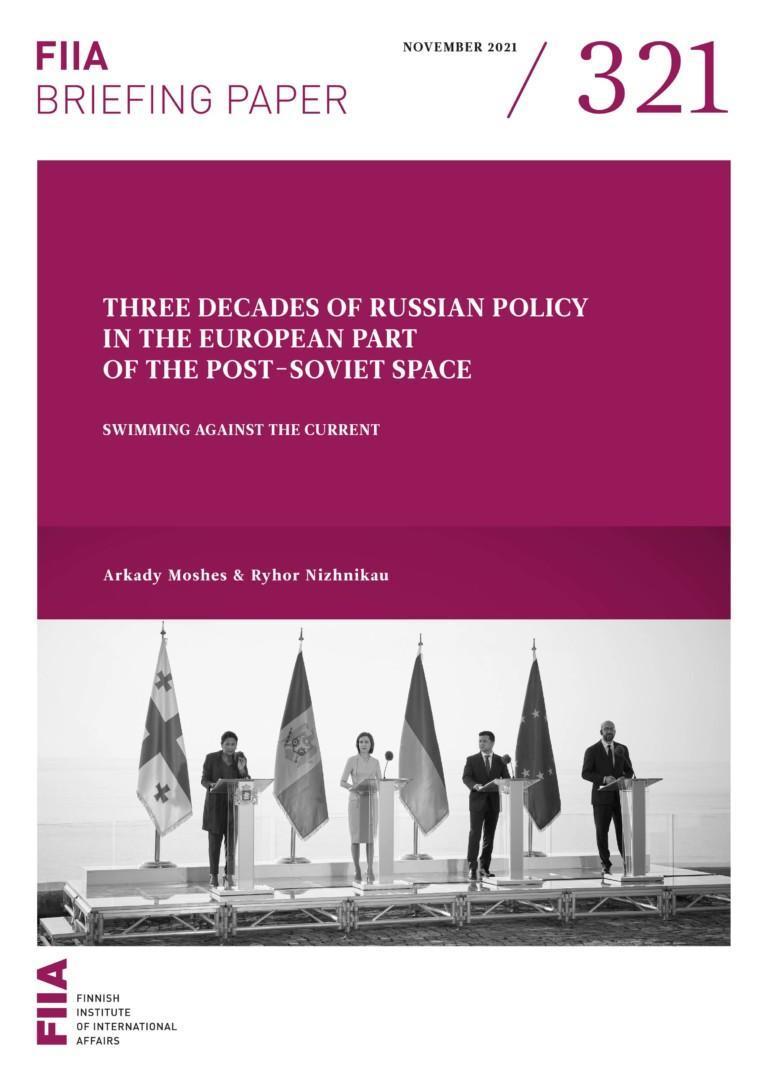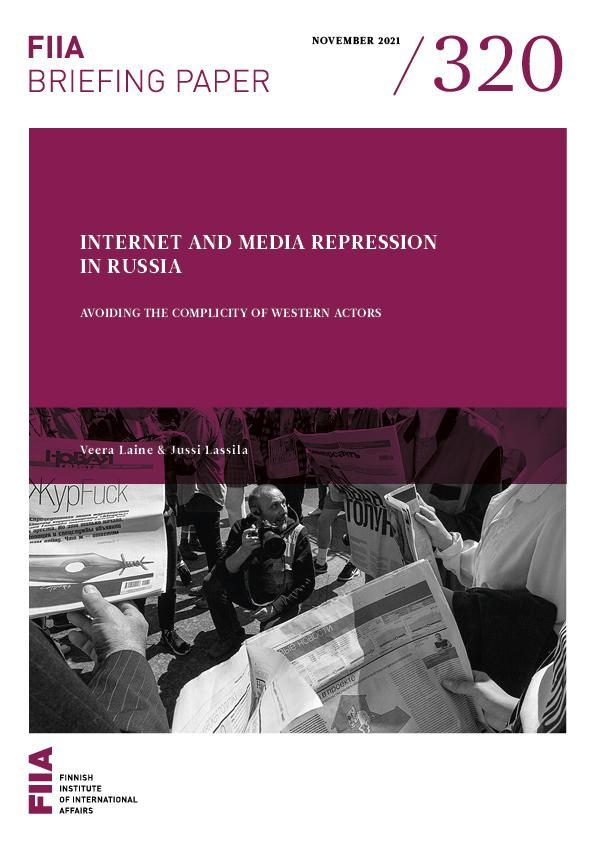Russia views Central Asia as its sphere of influence and attempts to keep the five post-Soviet countries, Kazakhstan, Kyrgyzstan, Tajikistan, Turkmenistan, and Uzbekistan, in its geopolitical orbit.
Central Asian countries’ dependency on Russia is decreasing, albeit at a different pace in different policy spheres and geographical areas. This variation depends upon factors ranging from Moscow’s priorities, the presence and capability of Russia and other actors, and Central Asian domestic issues.
Russia’s policy in Central Asia is rooted in bilateral relations, but from the early 2000s onwards, Moscow has sought to integrate the region’s states into multilateral organizations that it leads, primarily in the spheres of economy and security.
Russian influence in the region is greatest in the security sphere and, due to the rise of China, smallest in the economic sector. People-to-people contacts remain strong as a result of the common Soviet past and current migration flows. Central Asian countries share Russia’s authoritarian outlook on politics.
Russia remains a powerful player in Central Asia, but Moscow’s lack of a forward-looking strategy and its current great-power posturing threaten its dominance in the future.
Introduction
During the second half of 2021, the five former Soviet republics of Central Asia – Kazakhstan, Kyrgyzstan, Tajikistan, Turkmenistan, and Uzbekistan – have been celebrating their thirtieth anniversaries of independence with the usual grandeur, hosting military parades, concerts, and presidential addresses. Although none of the five countries drove the disintegration of the Soviet Union, they were all quick to embrace independence after 1991. Three decades of nation- and state-building have witnessed their gradual distancing from both the Soviet past and the principal successor of the Soviet Union – the Russian Federation.
This Briefing Paper analyses the trends in Russia’s policy in Central Asia in the post-Soviet period with an emphasis on the last decade. In addition to providing an overview of Russia’s bilateral relations with each of the Central Asian states, it examines patterns and shifts in four partially overlapping policy areas: economy and trade, security and military, culture and people-to-people contacts, and politics and governance. The paper finds that the Central Asian countries’ dependency on Russia is decreasing across the board despite Moscow’s explicit attempts to keep the five countries in its geopolitical orbit. It argues that Russia has not yet discovered a way to halt the gradual erosion of its influence in the region.
What is more, it seems unlikely that Russia has the means to strengthen its prominence in the region. This is due to Central Asia’s proximity to the rising China, the desire of all five states to remain sovereign and pursue “multi-vector” foreign policies that entail the diversification of political and economic ties, and the interpretation of Russia’s current Great Power ambitions by local elites as threatening. By recognizing the presence of a multitude of influential external actors and the Central Asian leaders’ preferences, this Briefing Paper contributes to the argument suggesting that Central Asia is indeed a region where the dynamics of the new multipolar world can be observed.[1]
Central Asian states’ distancing from Russia might be the general trend of the post-Soviet era, but it is not a linear one. Instead, the five states’ dependency on Russia is decreasing at a different pace in different policy spheres and geographical areas. There are also some cases where the Russian foothold is currently increasing. Although Moscow continues to view Central Asia as its sphere of influence, it perceives and reacts to the erosion of its influence differently from one sector and country to another. The aim of this paper is to shed light on these nuances.
MULTILATERALISM ROOTED IN BILATERALISM
The territory of contemporary Central Asian states was incorporated firstly into the Russian Empire and then into the Soviet Union (USSR) before any modern nation-states emerged in the region. The dominance of the Russian language and, to some extent, the Russian culture, was established over time. Up until the disintegration of the USSR, national consciousness was weak: in the March 1991 referendum on the future of the Soviet Union, over 95% of Central Asians voted for the preservation of the USSR. Although anti-Russian sentiment and narratives about Russia’s colonialism were on the rise in the early 1990s, they were marginalized in the 2000s. At present, Central Asian public opinion of Russia remains overwhelmingly favourable, in contrast to attitudes towards China and the United States.[2]
Russia’s foreign policy aspirations towards the newly independent states of Central Asia have evolved from the disinterest of the early 1990s to the desire to integrate the regional countries into the Russia-led institutional matrix in the 2000s and 2010s. In contrast to its attitude towards the former Soviet states at Russia’s Western borders, Moscow seems to take its sphere of influence in Central Asia for granted, possibly because its predominance in the region has never been resolutely challenged by another external actor. For example, the United States’ desire to gain a foothold in Central Asia in the early 2000s was motivated by its war on terror and proved to be temporary.
For the last two decades, Russia has explicitly sought to channel its foreign policy in Central Asia through its multilateral institutions, first and foremost the Collective Security Treaty Organization (CSTO) and the Eurasian Union (EAEU). Yet Moscow’s bilateral relations with Ashgabat, Bishkek, Dushanbe, Nur-Sultan, and Tashkent still remain at the core of Russian policy in the region due to Central Asian governments’ unwillingness to yield power to supranational institutions, and the antagonism between the region’s leaders.
Kazakhstan
Russia’s relationship with Kazakhstan is the closest and arguably the most akin to an equal partnership. The two share a 6800-kilometre border in the vicinity of which Kazakhstan hosts a sizeable – albeit decreasing – minority of ethnic Russians and Russian-speakers. In the 1990s and 2000s, Russian-Kazakh relations demonstrated a pattern of deepening integration, with Kazakhstan promoting and engaging in various cooperation projects with Russia, while also seeking to become a full-fledged member and participant in international organizations promoted by the West. However, Russia’s increasing assertiveness and aggressiveness towards its neighbours, particularly after the annexation of Crimea in 2014, prompted Nur-Sultan to adopt a more refrained approach towards Moscow in the 2010s. The Kazakhstani leadership has been eager to let Russian influence erode on its own by further strengthening ties with other regional and international actors, continuing its nation-building policies, and keeping political integration with Russia at bay. Moscow, however, has rarely criticized its number one ally over these policies, probably because Nur-Sultan’s manoeuvring is so subtle and Russian influence in the country so significant.
Kyrgyzstan
The post-Soviet era in Kyrgyzstan, once known as an “island of democracy” in an otherwise authoritarian Central Asia, has been marred by continuing political turmoil. Against the backdrop of domestic instability, Russia’s relationship with the independent Kyrgyzstan has been troublesome regardless of Bishkek’s continued willingness, under all leaderships thus far, to participate in Moscow-led integration projects and recognition of Russia’s importance. The weakness of Kyrgyzstan’s institutions is a double-edged sword for Russia: it justifies greater presence for security reasons and increases Bishkek’s dependency on Moscow, but it also poses challenges in the form of intensified migration and drug trafficking to Russia, as well as local and regional armed conflicts in which Russia has no interest in participating. Moreover, the presence of a growing number of Kyrgyz (and Tajik) labour migrants working in Russia generates interdependency between Moscow and Bishkek, as the Russian economy is as dependent on affordable Central Asian labour as the two states are on the remittances the migrants generate.[3]
Tajikistan
During the Tajik civil war in 1992–1997, Moscow supported the pro-government forces, led by the current President Emomali Rakhmon. As a legacy of the war, Russian border guards and the Russian 201st Motor Rifle Division remained in Tajikistan. The unit was reorganized into a permanent Russian base in 2004 and, according to the current bilateral agreement, will stay there until 2042 at least. Overall, Russia’s policy towards Tajikistan has been dominated by the security agenda throughout the post-Civil War period. Tajikistan’s porous border with Afghanistan raises concerns in Moscow because it is a route for drugs and Islamic extremism to Russia. Although President Rakhmon has systematically sought security collaboration with Moscow, Dushanbe’s relations with Moscow are not cordial. The development of interdependence between Russia and Tajikistan in the spheres of security and labour migration and Dushanbe’s deepening cooperation with Beijing, also in the security sector, limit Moscow’s unilateral influence in the country.
Turkmenistan
Turkmenistan remains the most isolated and one of the poorest countries in the post-Soviet region. Following its Doctrine of Positive Neutrality from 1995, Ashgabat has opted out of all Russia-led regional organizations, leaving the Russo-Turkmen relationship exclusively at the bilateral level. The quality and the strength of relations has varied over time. After a phase of tension in the 1990s, Turkmenistan became economically dependent on Russia in the 2000s due to a deal that granted Russia exclusive access to Turkmen gas. In turn, the opening of a new pipeline to China in 2009 led to a sharp decrease in exports to Russia and a cooling of relations. From the mid-2010s onwards, Ashgabat has again been rekindling its relationship with Moscow as a result of economic hardship, and thus might be the one country in the post-Soviet region where Russia’s influence is increasing rather than decreasing.
Uzbekistan
Russia’s relationship with Uzbekistan has been the most changeable in Central Asia. In the 1990s, Uzbekistan rejected all cooperation initiatives promoted by both Russia and Kazakhstan and sought to decouple from Moscow. With its decision to forge a strategic alliance with the US and host American troops in Kharsi-Khanabad in the early 2000s, Uzbekistan went as far as to move into the US sphere of influence.[4] However, the shift in foreign policy orientation was temporary. Uzbekistan’s rapprochement with Moscow began after the US-condemned Andijan massacre of 2005, albeit while continuing to opt out of Russia-led integration institutions. The foreign policy opening, embraced by Tashkent after the leadership change of 2016, has brought Uzbekistan closer to Russia, especially in the spheres of economy and security. Although Uzbekistan has still not joined the EAEU, Uzbekistan’s goal of strengthening trade connectivity bilaterally and regionally is likely to benefit Russia economically. Regardless of the recent strengthening of Russia-Uzbek relations, Uzbekistan remains the least dependent on Russia given its size, past policy of decoupling, and connections to other actors.
A SECTORAL ANALYSIS OF RUSSIAN POLICY
Moscow’s overarching aim of keeping the Central Asian states in the Russian geopolitical orbit applies to all four policy spheres discussed in this section: economy and trade, security and military, culture and people-to-people contacts, and politics and institutions. While the aim of halting the erosion of Russian influence has remained constant ever since Moscow (re)discovered its great-power ambitions in the late 1990s, the strategy of how to achieve it has varied over time. Currently, Moscow continues to generate leverage through its multilateral organizations, of which the CSTO for security and the EAEU for economic affairs are the two most prominent.[5]
Economy and trade
After the demise of the USSR, Russia’s trade with Central Asian states plummeted. However, economic relations started to show signs of revitalization in the early 2000s, when Russia successfully established cooperation in the energy sector with all five Central Asian states, leading to the expansion of Russian companies to their markets. Since then, Russia has created a number of multilateral trade blocs encompassing the region.[6] Their officially proclaimed goal has been to nurture economic integration that is beneficial for all participants. Nonetheless, Jeronim Perović argued as early as 2005 that the aim of Moscow’s energy and trade involvement in the region was to lock the states into critical dependency that could provide the Kremlin with leverage over their domestic and foreign policy choices.[7] The rationale applies to this day.
Yet it would be a mistake to interpret the present-day EAEU and the membership of Kazakhstan and Kyrgyzstan in it as a success story for Russian influence. On the contrary, the organization has failed to spur genuine integration since member states refuse to cede sovereignty to the bloc’s supranational institutions, except where import tariffs are concerned. Moreover, the EAEU has primarily benefited Russia’s economy, as other members’ share of trade within the bloc has remained limited.[8] It is economic collaboration with China, not Russia, that is rapidly expanding in the region. Russia lost its monopoly over Central Asian states’ energy export routes in the early 2000s, and natural gas and oil from Kazakhstan, Turkmenistan, and Uzbekistan can nowadays be transported to China directly. In 2019, China surpassed Russia as the biggest trade partner in all other Central Asian states but Kazakhstan.
In the end, even if the economic cooperation between Russia and Central Asia were to remain intact, Central Asian governments’ policy of strengthening trade with other actors will result in the further weakening of Russian influence over time. Labour migration, Russian companies’ presence in Central Asian markets, and the EAEU can slow the trend but not reverse it altogether.
Security and military
Security concerns are the primary motivation for Moscow’s involvement in Central Asia. Due to the difficulty in fortifying Russia’s southern border, destabilization in Central Asia would have immediate repercussions in Russia, be it in the form of Islamist infiltration, an increase in drug inflow, a loss of control over gas and oil pipelines, or an upsurge in migrants and refugees. Moscow thus invests in maintaining and strengthening ties both through its multilateral security institution, the CSTO, and bilaterally. Russia has a number of military and research facilities in Central Asia, namely the Baikonur Cosmodrome rented from Kazakhstan, the Kant air base in Kyrgyzstan, and the 201st Russian military base in Tajikistan. It conducts joint military exercises and trains Central Asian security personnel, and it is the largest arms supplier in the region.
Given the importance of Central Asia for Russia’s own security, Moscow has opted to concentrate its efforts on maximizing its influence in Central Asia in the military sphere – with Central Asia’s consent. After the Taliban’s takeover in Afghanistan, Central Asian states have been even more eager to welcome Russian security assistance, which could ensure Russian influence for years if not decades to come. Even Turkmenistan has recently ratified a joint security cooperation agreement with Russia and participated in the Russia-led Kavkaz 2020 military exercise.
Regardless of Moscow’s concentration and commitment, there are limits and challenges to Russia’s willingness and ability to provide security within the region. Throughout the post-Soviet period, Moscow has been reluctant to directly engage in Central Asian interregional crises. In 2010, Russia rejected the plea from Kyrgyzstan’s interim government to send a peacemaking force to southern Kyrgyzstan in order to settle ethnic unrest. In spring 2021, deadly clashes at the Kyrgyz-Tajik border once again demonstrated the limits of Russia’s peacemaking potential, given that both Kyrgyzstan and Tajikistan are Russia’s allies and members of the CSTO.
Furthermore, although Russia is still the dominant external security partner for the region, China – and, to an extent, Turkey – is gaining more and more influence in the security sphere, as has been demonstrated by the growth in arms trade and joint exercises. The trend suggests that the current Russo-Chinese division of labour in Central Asia, according to which China focuses on economic expansion while Russia takes responsibility for the region’s security, is no longer clear-cut.
Culture and people-to-people contacts
Russian influence in Central Asian societies is considerable. As a testimony to the shared past and Central Asian elites’ favourable attitude towards Moscow in the era of independence, the Russian language and culture are still clearly present, particularly in big cities. Upon the collapse of the USSR, Central Asia inherited a sizeable Russian minority which, according to the 1989 census, included almost ten million people. However, the Russophone population is shrinking fast, and remains substantial only in Kazakhstan, where the number of those self-identifying as Russian still make up almost 20% of the population.
While the number of Russian “compatriots” is falling, the Russian language remains popular because of the life and work opportunities available for Russian-speakers. Furthermore, Central Asian states’ nation-building efforts have not attempted to eradicate the Russian language and culture per se, although policies of popularizing the national language do sometimes come at a cost. For example, in 2018, President Nazarbayev instructed ministers and deputies to only use Kazakh in their work, effectively marginalizing the use of Russian. Moscow sometimes participates in the language debates, grudgingly voicing its criticism of Central Asian authorities.
Russia does not systematically invest in education institutes and media outlets that would preserve its cultural influence in Central Asia, perhaps because it thinks it does not have to. Russia’s soft power in Central Asia is undeniable and, as noted above, is clearly indicated by Central Asian public opinion.[9] However, the rise of China across policy sectors, and shifts in cultural preferences for generations born after the collapse of the USSR, suggest that Russia’s societal influence is likely to gradually diminish over time.
Politics and governance
Russia’s prominence in Central Asia in the sphere of politics and state governance is considerable, and the sector also ranks high in Moscow’s priorities. From the 2000s onwards, Russia has promoted its authoritarian model of governance in Central Asia and served as a model for responding to threats to the regime, be they in the form of “radical Islam” or “Western interference”.[10] Like Russia, all Central Asian states have a neopatrimonial politico-economic order that combines strongman rule with rampant corruption and economic rent-seeking.
Moscow’s support is vital for all Central Asian authoritarian leaders who hope to stay in power, and yet Russia’s influence in the countries’ political sphere is becoming increasingly limited. The individual leaders and broader political and economic elites of Central Asia value the sovereignty of their respective states, and thanks to the emerging global multipolarity and the gradual erosion of Russian influence in other sectors, they are becoming increasingly empowered to assert it. For example, in 2014, Kyrgyz authorities forced Moscow into a bidding game against the United States over the future of the now former US transit centre at Manas. Furthermore, state fragility is a major issue in Central Asia, especially in Kyrgyzstan and Tajikistan. As much as Russia prefers dealing with autocratic leaders over democratically elected ones, it is the weakness of state institutions in Kyrgyzstan that has caused more concern in Moscow than the country’s experimentation with political liberalization.
One way of looking at Russia’s influence in the political sphere is to see it as the sum of the trends in the other policy sectors. The more dependent Central Asia is on Russia economically, militarily, and culturally, the more leverage Russia has over the domestic and foreign policy of the states in the region.
CONCLUSIONS: A SPHERE OF INFLUENCE GROWING THIN?
This Briefing Paper has argued that Russia’s dominance in Central Asia is in decline, yet its erosion is taking place gradually and at a different pace in different policy spheres and countries. For example, in the context of China’s rise, Russia continues to dominate in the spheres of security and culture, while its economic influence is declining fast.
Despite the gradual erosion of Russian dominance, Central Asia can still be regarded as Russia’s sphere of influence. Nonetheless, it is also evident that the strengthening multipolarity of the global system continues to provide Central Asian states with opportunities to alleviate their dependency on Moscow and, as a result, the sphere of influence is becoming diluted. Halting this trend, given the decrease in Russia’s relative capacity, would require Moscow to come up with a forward-looking strategy that would recognize and respect the Central Asian states’ sovereignty and enable the revitalization of connections across the board. So far, the need to have such a strategy has not been understood by Moscow – possibly because it would be radically at odds with its very ambition to strive for a great-power status in the region and beyond.
Endnotes
[1] Cooley, A. (2012). Great Games, Local Rules: The New Great Power Contest in Central Asia. Oxford University Press.
[2] Laruelle, M. & Royce, D. (2020). “No Great Game: Central Asia’s Public Opinions on Russia, China, and the U.S.”, Kennan Cable No. 56, https://www.wilsoncenter.org/publication/kennan-cable-no-56-no-great-game-central-asias-public-opinions-russia-china-and-us.
[3] The remittances’ share of the state’s GDP in 2019 was officially 27% in Kyrgyzstan, 28% in Tajikistan, and 15% in Uzbekistan. Due to the prevalence of irregular work, the real figures are likely to be even higher. In 2019, there were over two million Uzbeks, one million Tajiks, and about 700,000 Kyrgyz nationals in Russia. Sources: World Bank Database (2021), https://data.worldbank.org/indicator/BX.TRF.PWKR.DT.GD.ZS?end=2020&locations=UZ-KG-TJ&start=2010; Eraliev, S., & Urinboyev, R. (2020). “Precarious Times for Central Asian Migrants in Russia”, Current History, 119 (819), 258.
[4] Anceschi, L. (2010). “Integrating domestic politics and foreign policy making: the cases of Turkmenistan and Uzbekistan”, Central Asian Survey, 29(2), 150.
[5] The Commonwealth of Independent States (CIS) and the Shanghai Cooperation Organization (SCO) are two further notable regional organizations that Central Asian states are members of, but they are not discussed in this paper due to their relatively limited impact (CIS) or lack of exclusively Russian leadership (SCO).
[6] In 1995, Belarus, Kazakhstan, and Russia established a tariff-free trade zone, which Kyrgyzstan and Tajikistan joined in 1998. The organization was restructured as the Eurasian Economic Community (EurAsEC) in 2000 and terminated in 2014 due to the establishment of the EAEU, which currently has five member states: Armenia, Belarus, Kazakhstan, Kyrgyzstan, and Russia. Tajikistan has had a Free Trade Agreement with the EAEU since 2016, and Uzbekistan an observer status since 2020. Debates about both countries’ full accession continue.
[7] Perović, J. (2005). “From Disengagement to Active Economic Competition: Russia's Return to the South”, Demokratizatsiya, 13(1), 61.
[8] Bhutia, S. (2019). “Russia dominates Eurasian Union trade. Here are the numbers”, Eurasianet, October 18, https://eurasianet.org/russia-dominates-eurasian-union-trade-here-are-the-numbers.
[9] Laruelle, M. & Royce, D. (2020). “No Great Game: Central Asia’s Public Opinions on Russia, China, and the U.S.”, Kennan Cable No. 56, https://www.wilsoncenter.org/publication/kennan-cable-no-56-no-great-game-central-asias-public-opinions-russia-china-and-us.
[10] In the sphere of religion, Central Asian elites and the majority of Central Asians share Russia’s model of “secular” Islam. On policy transfer from Russia to Central Asia, see e.g. Lemon, E., & Antonov, O. (2020). “Authoritarian Legal Harmonization in the Post-Soviet Space”, Democratization, 27(7), 1221–1239.







